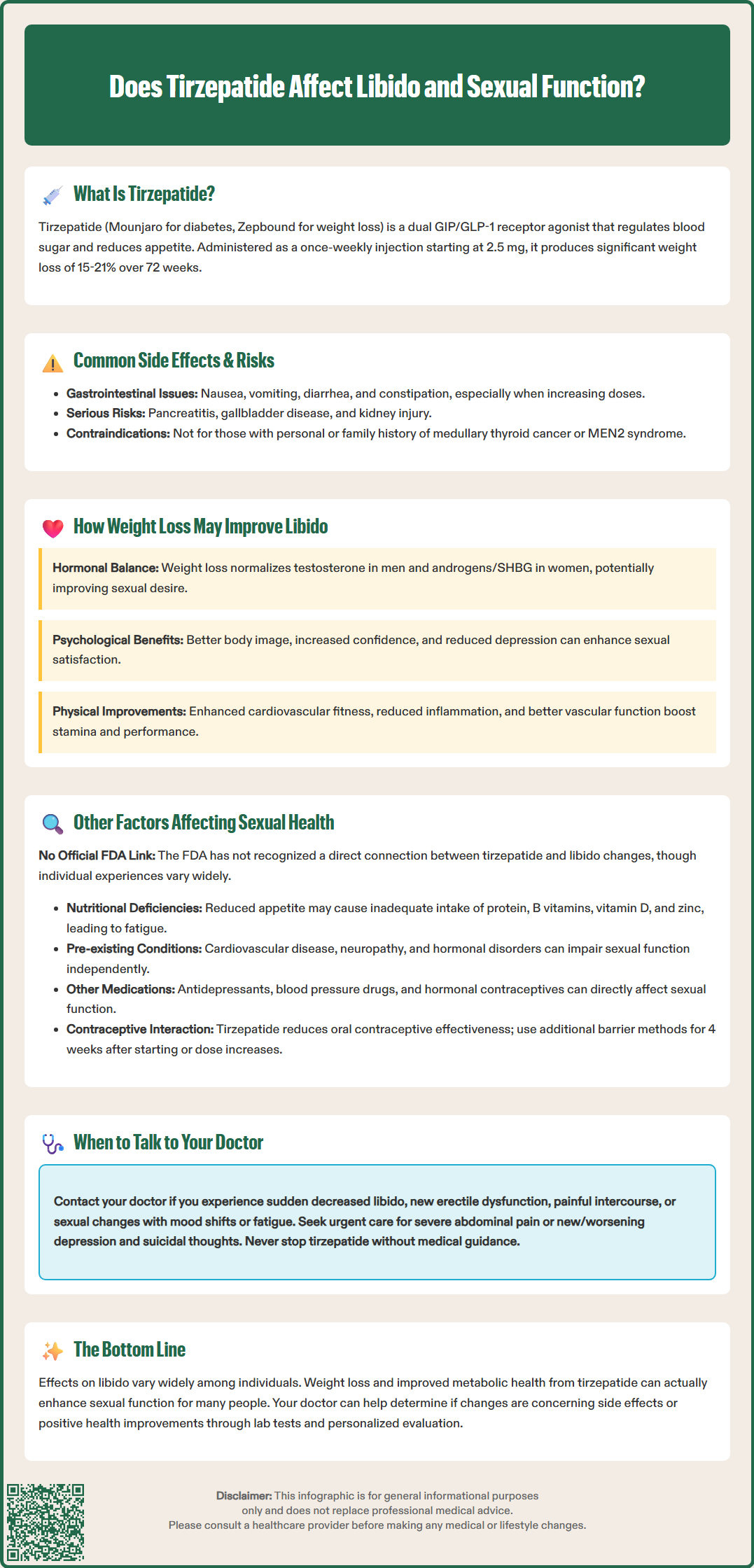LOSE WEIGHT WITH MEDICAL SUPPORT — BUILT FOR MEN
- Your personalised programme is built around medical care, not willpower.
- No generic diets. No guesswork.
- Just science-backed results and expert support.
Find out if you’re eligible

Tirzepatide (Mounjaro for type 2 diabetes, Zepbound for weight management) is a dual GIP/GLP-1 receptor agonist that has generated questions about potential effects on sexual function. While there is no FDA-recognized direct link between tirzepatide and increased libido, some patients report changes in sexual desire during treatment. These changes are likely related to significant weight loss, hormonal normalization, improved body image, and enhanced metabolic health rather than a direct pharmacological effect. Understanding the complex relationship between weight loss medications and sexual health helps patients and clinicians make informed treatment decisions.
Quick Answer: Tirzepatide does not directly increase libido, but weight loss from the medication may improve sexual function through hormonal normalization and enhanced body image.
Tirzepatide is a prescription medication approved by the FDA for the treatment of type 2 diabetes (marketed as Mounjaro) and chronic weight management (marketed as Zepbound). It belongs to a novel class of medications known as dual glucose-dependent insulinotropic polypeptide (GIP) and glucagon-like peptide-1 (GLP-1) receptor agonists.
The medication works by mimicking two naturally occurring hormones in the body. GLP-1 stimulates insulin secretion when blood glucose levels are elevated, suppresses glucagon release, and slows gastric emptying. GIP also enhances insulin secretion and may influence fat metabolism. Together, these actions help regulate blood sugar levels and reduce appetite, leading to significant weight loss in many patients.
Tirzepatide is administered as a once-weekly subcutaneous injection, with doses typically starting at 2.5 mg for initiation (not for glycemic control). Maintenance doses range from 5 mg to 15 mg for weight management and up to 15 mg for type 2 diabetes, depending on individual response and tolerability. In clinical trials for weight management (SURMOUNT-1), participants without diabetes lost approximately 15% of body weight at 5 mg, 20% at 10 mg, and 21% at 15 mg over 72 weeks. Weight loss tends to be somewhat less in people with type 2 diabetes.
The medication's effects on appetite and satiety are mediated through central nervous system pathways, particularly in areas of the brain that regulate hunger and food intake. Common adverse effects include gastrointestinal symptoms such as nausea, vomiting, diarrhea, and constipation, typically most pronounced during dose escalation.
Important safety information: Tirzepatide carries a boxed warning for risk of thyroid C-cell tumors and is contraindicated in patients with personal or family history of medullary thyroid carcinoma (MTC) or Multiple Endocrine Neoplasia syndrome type 2 (MEN2). Other serious risks include pancreatitis, gallbladder disease, acute kidney injury, hypoglycemia (when used with insulin or insulin secretagogues), and diabetic retinopathy complications. Tirzepatide is not indicated for type 1 diabetes and is not recommended during pregnancy.
There is no official FDA-recognized link between tirzepatide and increased libido or sexual arousal. However, anecdotal reports from some patients suggest changes in sexual function during treatment, which may be attributed to several indirect mechanisms rather than a direct pharmacological effect of the medication itself.
Significant weight loss, regardless of the method achieved, can impact sexual health and libido through hormonal changes. Obesity is associated with reduced testosterone levels in men, while in women, obesity often increases free androgens and decreases sex hormone binding globulin (SHBG), particularly in conditions like polycystic ovary syndrome (PCOS). As patients lose weight, these hormonal profiles often normalize, potentially leading to improved sexual function and desire.
Additionally, weight loss frequently results in enhanced body image, increased self-confidence, and reduced symptoms of depression and anxiety—all psychological factors that significantly influence sexual desire and satisfaction. Improved cardiovascular fitness and reduced inflammation associated with weight loss may also enhance physical stamina and vascular function, which are important for sexual performance.
It is important to note that the relationship between weight loss medications and libido is complex and highly individualized. Some patients may experience improvements in sexual function, while others may notice no change or even temporary decreases due to factors such as caloric restriction, fatigue during the adjustment period, or gastrointestinal side effects that affect overall well-being. The scientific literature does not currently support a direct mechanism by which tirzepatide would increase sexual arousal independent of its weight loss effects.

Multiple variables beyond the medication itself can significantly impact sexual health during tirzepatide treatment. Understanding these factors helps patients and clinicians distinguish between medication effects and other contributing influences.
Nutritional status and energy levels play a crucial role. Patients on tirzepatide often experience reduced appetite and may inadvertently consume insufficient calories or essential nutrients. Inadequate protein intake, vitamin deficiencies (particularly B vitamins, vitamin D, and zinc), and overall caloric restriction can lead to fatigue and reduced libido. Maintaining adequate nutrition while achieving weight loss is essential for preserving sexual function. An individualized nutrition assessment with a registered dietitian may be beneficial.
Underlying medical conditions frequently coexist with obesity and diabetes. Cardiovascular disease, peripheral neuropathy, and hormonal disorders can all impair sexual function. As metabolic health improves with weight loss and better glycemic control, some of these conditions may improve, potentially enhancing sexual health. Conversely, unaddressed comorbidities may continue to affect libido regardless of weight loss.
Concurrent medications must also be considered. Many patients taking tirzepatide are also prescribed other medications that can affect sexual function, including:
Antidepressants (particularly SSRIs)
Some antihypertensive medications (especially thiazide diuretics and beta-blockers)
Hormonal contraceptives
Important contraceptive information: Tirzepatide can reduce oral contraceptive exposure after initiation and dose increases. If you use oral contraceptives, consider using a non-oral method or adding a barrier method for 4 weeks after starting tirzepatide and after each dose escalation.
Relationship dynamics and psychological factors are equally important. Weight loss can alter relationship dynamics, body image perceptions, and self-esteem. Some patients experience renewed confidence and intimacy, while others may face unexpected challenges as their physical appearance changes. Stress related to lifestyle modifications, dietary changes, and the financial burden of treatment can also impact sexual desire and function.
Open communication with your healthcare provider about sexual health concerns is essential for comprehensive care. While changes in libido are not listed as common adverse effects of tirzepatide, any significant or distressing changes in sexual function warrant medical evaluation.
Schedule an appointment if you experience:
Sudden or significant decrease in sexual desire that affects your quality of life or relationships
New-onset erectile dysfunction or difficulty with arousal
Painful intercourse or other physical symptoms during sexual activity
Concerning changes in sexual function accompanied by other symptoms such as mood changes, fatigue, or hormonal symptoms
New or worsening depression or suicidal thoughts (Zepbound carries a warning for suicidal ideation)
Severe, persistent abdominal pain (with or without vomiting), which could indicate pancreatitis or gallbladder disease requiring urgent evaluation
Your physician can conduct a thorough assessment to identify potential underlying causes. This evaluation may include laboratory testing to assess hormone levels (testosterone, SHBG, prolactin in men; thyroid function in all patients; sex-steroid evaluation in women when indicated), screening for nutritional deficiencies, reviewing all current medications for potential interactions or side effects, and evaluating cardiovascular and metabolic health markers.
It is important to distinguish between medication side effects and improvements in sexual function related to weight loss and metabolic health optimization. Your doctor can help determine whether any changes you experience are concerning or represent positive adaptations to improved health status.
Do not discontinue tirzepatide without medical guidance. If sexual side effects are attributed to the medication, your healthcare provider can discuss alternative treatment options, dose adjustments, or strategies to manage symptoms while continuing therapy. In some cases, referral to an endocrinologist, urologist, gynecologist, or sexual health specialist may be appropriate for specialized evaluation and management. Remember that sexual health is an important component of overall well-being and deserves the same attention as other aspects of your medical care.
No, there is no FDA-recognized direct pharmacological effect of tirzepatide on sexual arousal or libido. Any changes in sexual function are likely related to weight loss, hormonal normalization, improved body image, and enhanced metabolic health rather than a direct medication effect.
Weight loss can normalize hormonal profiles, including increased testosterone levels in men with obesity and improved sex hormone binding globulin levels in women. These hormonal changes may contribute to improved sexual function and desire in some patients.
Contact your healthcare provider if you experience sudden or significant changes in sexual desire, new-onset erectile dysfunction or arousal difficulties, painful intercourse, or sexual function changes accompanied by mood changes or fatigue. Your doctor can evaluate potential underlying causes and determine appropriate management strategies.
All medical content on this blog is created using reputable, evidence-based sources and is regularly reviewed for accuracy and relevance. While we strive to keep our content current with the latest research and clinical guidelines, it is intended for general informational purposes only.
This content is not a substitute for professional medical advice, diagnosis, or treatment. Always consult a licensed healthcare provider with any medical questions or concerns. Use of this information is at your own risk, and we are not liable for any outcomes resulting from its use.